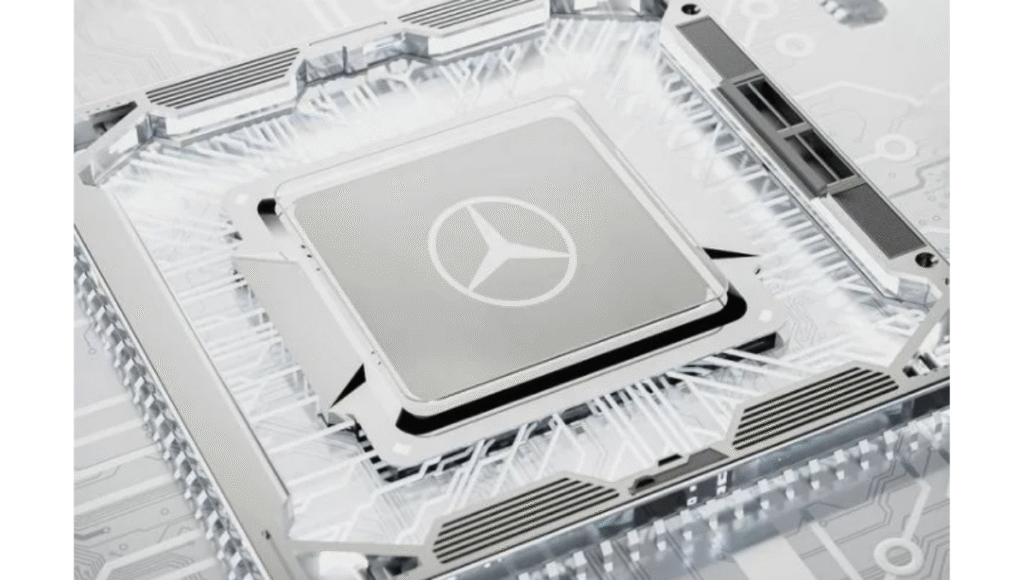
Mercedes & Athos Silicon with Athos Silicon to Drive the Future of Chiplet Technology
In today’s fast-changing automotive world, the race to build safer, smarter, and more efficient vehicles is pushing companies to form partnerships that blend innovation with real-world experience. Mercedes-Benz has taken an exciting step forward by announcing a collaboration with Athos Silicon, a semiconductor company founded by former engineers from Mercedes-Benz Research & Development North America (MBRDNA). Together, they aim to accelerate the adoption and scaling of chiplet technology—an innovation set to transform autonomous driving and beyond.
A Partnership Rooted in Innovation
Athos Silicon was born out of expertise gained within Mercedes’ own research wing, and now the company is using that foundation to pioneer advanced semiconductor technologies. The partnership with Mercedes-Benz will focus on reference design collaboration, particularly around chiplet architectures. These architectures are expected to power next-generation autonomous driving platforms by making them faster, safer, and more efficient.
Mercedes has long been a leader in bringing cutting-edge technologies into its vehicles, from safety advancements to electrification. By embracing chiplet technology, the company is ensuring that future cars won’t just be about speed and luxury—they’ll also be about intelligent performance and adaptability.
Chiplets: Powering the Future of Autonomous Driving
So, what exactly makes this collaboration so important? At the core lies chiplet technology. Unlike traditional monolithic chips, chiplets are smaller modular chips that can be combined to create highly customized processors. This modular approach offers greater flexibility, better performance, and improved efficiency—making them ideal for the immense computing demands of autonomous driving.
Autonomous systems require enormous amounts of data to be processed in real time. From interpreting road conditions to responding instantly to potential hazards, vehicles must perform like powerful computers on wheels. Chiplets allow companies like Mercedes-Benz and Athos Silicon to build specialized processors that can handle this complexity while reducing costs and improving scalability.
Beyond Cars: Expanding into Robotics, Drones, and Aerospace
While the initial focus of the partnership is on automotive applications, Athos Silicon has its eyes set on a much larger horizon. The company has already confirmed plans to extend its mSoC (Multiple Systems on Chip) solutions into broader autonomy applications. This includes robotics, drones, and even aerospace—fields where high-performance computing and autonomous capabilities are critical.
This expansion could create a ripple effect, pushing chiplet innovation far beyond the automobile industry and into sectors that shape our everyday lives, from delivery drones to space exploration.
Mercedes-Benz’s Vision for Safer and Smarter Mobility
Markus Schäfer, Chief Technology Officer at Mercedes-Benz, emphasized the importance of open chiplet approaches such as UCIe™ (Universal Chiplet Interconnect Express) in building the future of mobility. These open standards promise to improve collaboration, innovation, and performance across industries.
“Mercedes-Benz continuously explores technologies that can advance safety, performance and automated driving,” Schäfer explained. By working with Athos Silicon, Mercedes is not only ensuring its vehicles remain at the forefront of innovation but also supporting the growth of a technology ecosystem that could redefine what autonomous platforms can achieve.
A New Chapter in Semiconductor Development
This collaboration reflects a growing trend in the automotive and technology industries: cross-disciplinary partnerships that break down silos and pool expertise. Mercedes brings its legacy of engineering excellence and industry leadership, while Athos Silicon contributes cutting-edge semiconductor knowledge and a startup mindset geared toward bold innovation.
The result could be transformative. Together, the two companies are well-positioned to pioneer chiplet solutions that improve the performance of autonomous systems, lower development costs, and enable safer, more efficient vehicles.
Looking Toward Tomorrow
As cars evolve into intelligent machines, the demand for advanced computing power will only grow. The collaboration between Mercedes-Benz and Athos Silicon represents more than just a business deal—it’s a glimpse into a future where vehicles are smarter, industries are more interconnected, and technology works seamlessly to improve human lives.
By exploring chiplet architectures for next-generation mobility, Mercedes-Benz is signaling that it intends to stay ahead of the curve, not only as a luxury automaker but also as a technology leader. And with Athos Silicon’s innovative drive, this partnership has the potential to push the boundaries of autonomy into new frontiers like robotics and aerospace.
The journey has just begun, but one thing is clear: the road ahead for autonomous driving just became a lot more exciting.
Disclaimer: The details provided in this article are based on official announcements and industry reports available at the time of writing. Future developments, technical specifications, and product outcomes may vary as the collaboration progresses.






